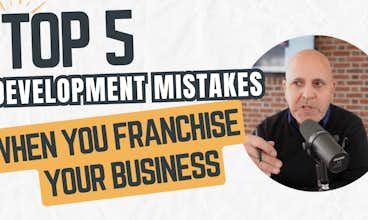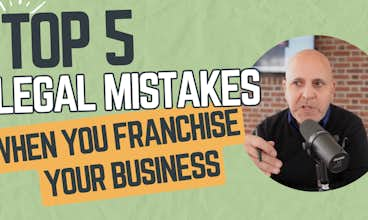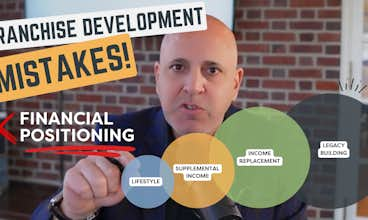Building a framework to win at franchising
For franchisors, the key to success often comes down to one thing: knowing and mastering the fundamentals of the industry.
Whether you’re just starting or you’re a veteran multi-unit franchisor, taking care of the foundational elements of your business is critical for long-term success. From developing sound operational documents to establishing a strong culture and building a rock-solid legal foundation, there are steps you can take to create a framework for success at any stage of your career.
In this guide, we’ll explore the strategies every franchisor needs to know to master the fundamentals of franchising.
1. The Importance of the Operations Manual
As the blueprint and how-to guide for your franchise system, the franchise operations manual is a fundamental asset for ensuring that your franchise system runs smoothly, efficiently and consistently. In spite of that, the document is often underappreciated and overlooked by franchisors.
Still, having an operations manual is a foundational element of success in any franchise system. When properly prepared, it provides franchisees with information about a brand’s systems, standards, operating procedures and suppliers. A good manual also contains information about a brand’s requirements for developing, marketing, and operating each location – ensuring uniformity across units, systems and services.
Keep It Consistent
Because the operations manual serves the purpose of organizing, communicating, and documenting your franchise system’s operational procedures, systems, and requirements, it’s important to ensure its contents are consistent with the information and obligations outlined in your Franchise Disclosure Document and Franchise Agreement.
“It's very important that, when I build out an operations manual, what I do is I take the FDD and I take the FA and I make sure that those promises that the franchisor has made to the franchisee are right there in the operations manual,” says Holly Katko, CEO of UConnect Solutions, a company that specializes in business training and consulting.
By keeping your operations manual consistent with your franchise system’s legal documents, you can ensure that your legal obligations to franchisees as a franchisor are met – and that your franchisees have the information they need to thrive as business owners.
Make It Accessible
For decades, franchisors provided franchisees with printed operations manuals that often contained an overwhelming amount of information in an inconvenient, and insecure, physical format. Due to innovations in technology over time, however, those days are over.
Today, operations manuals are typically digital, interactive and accessible to franchisees via learning management systems – secure online portals that ensure the document is available to franchisees anywhere in the world while protecting a brand’s systems, processes and other trade secrets from the prying eyes of competitors.
“My recommendation when it comes to an operations manual is that you actually take it and you put it in an LMS. … It goes into a portal so only franchisees have the ability to go into that portal and look at it. What that does for you, is it protects that document – because (your operations manual) is your lifeblood,” Katko says.
Stay Flexible – and Legal
Although it can be a relief to complete your operations manual when you’re just getting started, keep in mind that your brand’s systems and processes will likely change as the organization matures. Because of that, it’s important to draft your manual in a way that allows for future changes without impeding growth.
“Focus on your operations manual in a real, holistic way. First, evaluate what you've promised your franchisees and make sure you're covering that in the ops manual. Develop it in a way that it's going to become a working tool – a living document,” says Charles N. Internicola, a franchise attorney with over 25 years of experience and the founder of The Internicola Law Firm.
Because the franchise industry is heavily regulated at the federal and local state levels, it’s also important to ensure that your operations manual remains consistent with franchise laws. To ensure legal compliance, have an experienced franchise attorney review each version of your operations manual before granting access to franchisees.
2. Build a Framework for Brand Culture
As a franchisor looking to scale your business, there is possibly nothing more important for success than establishing a strong brand culture within your organization.
“Keep in mind that the franchisee has, or is going to, purchase your brand. And your brand is your culture,” Katko says.
To introduce a framework for an internal culture built around your brand’s mission and values, consider taking the following actions:
Conduct a SWOT analysis. By evaluating your organization’s strengths, weaknesses, opportunities and threats, you can measure your internal culture and make adjustments where they’re needed.
Set SMART goals. Develop goals using the SMART system: specific, measurable, achievable, relevant and time-bound.
Define your culture. As a founder and franchisor, it’s up to you to determine the values you want to build your company’s culture around.
Weather the storms. Corporate teams often pass through phases ranging from strong, enthusiastic crews to “stormy” phases where personalities clash. By finding effective ways to weather the storms, you can help your team develop stronger relationships and improve performance.
By using data from your SWOT analysis to achieve your SMART goals, you’ll be able to build a well-defined culture that’s attractive to franchisees and supports growth.
3. Use a SWOT Analysis to Scale SMARTer
When it comes to franchising, being able to measure success in every area of your business is critical. Because of that, conducting a multi-level SWOT analysis of your whole franchise system can help identify your organization’s strengths and weaknesses – and measure improvement.
“Utilizing SWOT is the first key point to being able to measure culture. So, what are those strengths, weaknesses, opportunities and threats? … What specific tools do you have in your toolbox to actually build out your culture?” Katko says.
While conducting a SWOT analysis, analyze your franchise system at multiple levels including:
The brand level. Evaluate your franchise brand as an individual entity, paying close attention to its strengths, weaknesses, opportunities and threats as a business.
The franchisee level. Next, do the same for your franchisees. How are they performing, and what’s getting in the way of achieving their goals? How can you help them succeed?
The employee level. Finally, conduct the same analysis at the employee level. What challenges and opportunities are your employees facing? Look for ways you can use the data to serve them better.
By analyzing your brand’s key performance indicators at multiple levels, you can create a measurable picture of your brand’s culture – and forge more supportive relationships with your team as you scale.
4. Develop Culture-Based Leadership and Growth Strategies
Good leadership and strong teams are a fundamental part of franchising success. To position your brand for success, it’s important to develop leadership strategies that prioritize culture – and people.
“The growth of a franchise system is more dependent on franchisee sales growth and new franchise sales. … So when you're building SMART goals in relation to culture, if one of the outbound or macro goals is to improve sales, you sort of reverse engineer that back into culture,” Internicola says.
For franchisors, that can mean using team meetings as an opportunity for culture-building. By building a culture around authentic, supportive relationships, you can ensure that every team member, franchisee and employee feels seen, heard and valued.
“(When franchisors are) playing executive and they're going through the motions – I've sat in many board meetings where I've seen that – I believe the genesis of the problem is really not connecting with the people on the team,” Internicola says.
By mastering the fundamentals of franchising – and creating a supportive culture where franchisees and team members have the tools to thrive – you can put your organization on the road to success at any stage of your franchisor journey.
Are you ready to master the fundamentals of franchising? Contact us to learn about the services we offer to help franchisors win.








